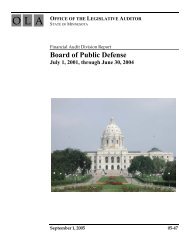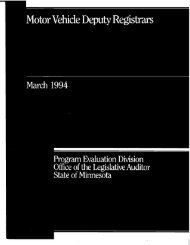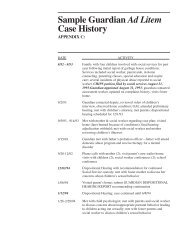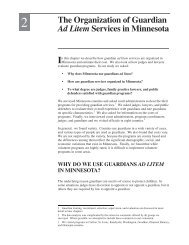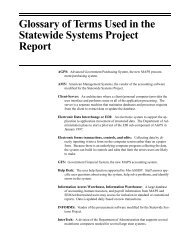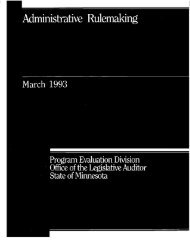Occupational Regulation - Office of the Legislative Auditor
Occupational Regulation - Office of the Legislative Auditor
Occupational Regulation - Office of the Legislative Auditor
You also want an ePaper? Increase the reach of your titles
YUMPU automatically turns print PDFs into web optimized ePapers that Google loves.
EFFECTIVENESS OF OCCUPATIONAL REGULATION 69<br />
One criterion defining <strong>the</strong> need to regulate in Chapter 214 is whe<strong>the</strong>r <strong>the</strong> practice<br />
<strong>of</strong> an occupation requires specialized skills or training, and whe<strong>the</strong>r <strong>the</strong> public<br />
needs and will benefit from assurances <strong>of</strong> initial and continuing occupational<br />
ability. 18 We reviewed regulated occupations in Minnesota to see how many<br />
lacked significant statutory requirements for education, experience, examination,<br />
and continuing education.<br />
We found:<br />
· Out <strong>of</strong> 188 regulated occupations, 82 have no statutory educational<br />
requirements beyond a high school diploma, 69 have no requirements<br />
for specialized experience, and 32 have no examination requirements.<br />
Twelve occupations have nei<strong>the</strong>r specialized education, experience, or<br />
examination requirements.<br />
Some regulated<br />
occupations<br />
have no<br />
specialized<br />
education,<br />
experience, or<br />
examination<br />
requirements.<br />
In addition, 75 occupations <strong>of</strong> <strong>the</strong> 188 regulated occupations have no continuing<br />
education requirements.<br />
The issue <strong>of</strong> whe<strong>the</strong>r <strong>the</strong> state should continue to regulate <strong>the</strong>se or o<strong>the</strong>r<br />
occupations obviously requires more detailed study, but a review <strong>of</strong> <strong>the</strong> database<br />
and Directory we have put toge<strong>the</strong>r can suggest where to start. Table 3.6 lists <strong>the</strong><br />
regulated occupations with <strong>the</strong> most limited statutory requirements. Several <strong>of</strong><br />
<strong>the</strong>se occupations have no educational requirements beyond a high school<br />
diploma, no experience requirements, no examination requirements, and no<br />
requirements for continuing education. The remainder have requirements in only<br />
one <strong>of</strong> <strong>the</strong>se categories. In addition, many <strong>of</strong> <strong>the</strong>se occupations are among <strong>the</strong> 67<br />
reporting occupations that indicated receiving no formal complaints over a two<br />
year period, calling into question whe<strong>the</strong>r regulation <strong>of</strong> <strong>the</strong>se occupations is<br />
necessary.<br />
A number <strong>of</strong> <strong>the</strong> people we interviewed note that <strong>the</strong> statutes governing<br />
occupational regulation are <strong>of</strong>ten out <strong>of</strong> date and in need <strong>of</strong> revision. We did not<br />
attempt to measure <strong>the</strong> extent <strong>of</strong> <strong>the</strong>se problems although it is fairly easy to find<br />
examples that appear to contradict <strong>the</strong> basic policy articulated by Chapter 214.<br />
For example, <strong>the</strong> licensure <strong>of</strong> plumbers is required only in cities over 5,000<br />
population. 19 If licensure is required because <strong>of</strong> a threat to health or safety (<strong>the</strong><br />
primary criterion <strong>of</strong> Chapter 214), it should be required everywhere. In fact, <strong>the</strong><br />
Minnesota Department <strong>of</strong> Health has made this argument, so far without success,<br />
because it is opposed by representatives <strong>of</strong> licensed plumbers. If plumbers present<br />
a threat to public health that is no greater than that presented by o<strong>the</strong>r building<br />
trades most <strong>of</strong> which are not regulated, or if it is judged that o<strong>the</strong>r types <strong>of</strong><br />
regulation such as enforcement <strong>of</strong> building standards is sufficient, <strong>the</strong>n state<br />
licensure <strong>of</strong> plumbers could be eliminated statewide. 20<br />
18 Minn. Stat. §214.001.<br />
19 The justification for licensing plumbers is based on <strong>the</strong> potential public health threat conveyed<br />
through municipal water and sewer systems. Licensure is not required for plumbers working<br />
on houses or businesses served by individual wells or on-site waste disposal systems.<br />
20 See Appendix B for more discussion <strong>of</strong> this issue.



